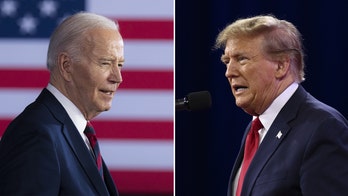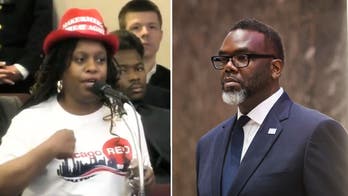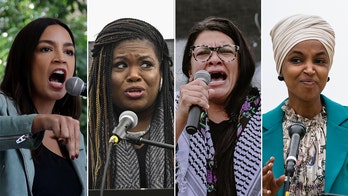Seattle residents slam proposals to defund the police as 'a radical experiment'
Former Seattle city council candidate Ari Hoffman weighs in.
As crime spikes in many cities and calls to defund the police rise, so too has the demand for guns -- yet while these trends widely are seen as related, it remains difficult or time-consuming in many of these same places to get a firearm.
Firearm-related background checks reached 3.9 million nationally in June, the most since the tracking system was created more than two decades ago, a sign of booming sales. The FBI conducted 3.6 million such checks in July, the second-highest number on record. Mark Oliva, director of public affairs for the National Shooting Sports Foundation, which represents gunmakers, said the confluence of calls to defund police along with civil unrest and various crime connected to that is "unquestionably ... why this trend is increasing."
Aside from unrest in places like Seattle, chaos erupted overnight in Chicago in response to a police-involved shooting.
But in some of the Democrat-dominated cities taking steps to defund or curtail their police departments, worrying many that response times may be increased as resources are stretched thin, getting a gun for personal protection is no easy task.
Reasons include tight gun laws, pandemic-related backlogs and even a dearth of stores.
NEARLY HALF OF 258 SURVEYED POLICE AGENCIES' BUDGETS CUT: REPORT
Seattle is one of those cities, with the City Council recently releasing a plan that could reduce its police department's size by up to 100 officers by the end of the year, according to the Seattle Times. But that could just be a precursor, with the council also passing a resolution calling for more fundamental changes in how the department works in 2021.
Meanwhile, most property crime in Seattle (outside of a significant drop in larceny-theft) has increased in 2020. In every month since March, Seattle has had more burglaries than any corresponding month since at least 2016. In June and July, it set five-year highs for motor vehicle theft, compared to corresponding months from previous years.
The city's six homicides in July tied July 2018 and January of this year to mark five-year monthly highs. The 272 aggravated assaults Seattle saw in July were the second-highest number in a single month in the past five years, behind just August 2018, which had 273.
Meanwhile, arson numbers for June and July were about 50 percent higher than the city's previous monthly highs for the past five years. Numbers for robbery and rape are down overall.
Yet, someone trying to buy a gun in Seattle would be out of luck -- there's almost nowhere to get one. While Washington state has a preemption law regarding guns, meaning that only the state can make gun laws rather than localities, Seattle managed to find a loophole. In 2016 it instituted a steep tax on guns and ammunition sold in the city, which eventually chased out nearly all the gun stores.
"That's been a loser tax in the fact that all the gun shops except for one have left and the one that's remaining there, they have a second location down near Tacoma," Jane Milhans, a longtime gun-rights activist in Washington, told Fox News. "So they can send customers down there to pick up firearms and not have the tax."
And for those with the means to leave the city to get a gun, Milhans says the Washington state gun laws will force them to wait.
"Since July of 2019, if you want to purchase a pistol, for example, you have to get an enhanced background check," Milhans said. "So any first-time buyer who needs a firearm for personal protection is gonna have to buy a can of bear spray to hold them over until they get it."
But Seattle is far from the only place where increased crime, moves to defund the police and difficult processes to get a gun are intersecting.
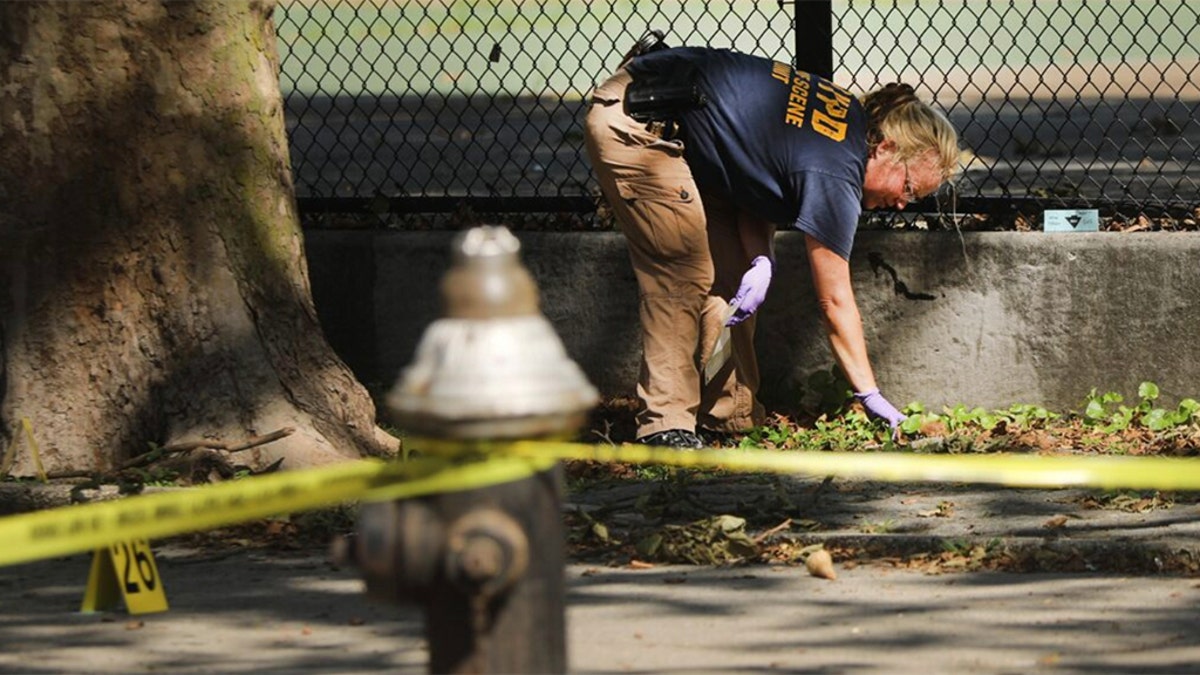
Police work at a crime scene in Brooklyn where a 1-year-old child was shot and killed on July 13 in New York City. The boy was shot near a playground during a Sunday cookout when gunfire erupted. Shootings have increased nationwide with young victims having become unintended targets. (Photo by Spencer Platt/Getty Images) (Getty)
GUN BACKGROUND CHECKS HIT RECORD HIGH IN JUNE, A SIGN OF BOOMING SALES, FBI REVEALS
New York City in late June announced that it would cut $1 billion from the New York Police Department's (NYPD) roughly $6 billion budget. Meanwhile, as of July 26, the city had by far its highest numbers of murders, shooting victims and shooting incidents since 2016. In 2020, there had been 227 murders in the city, up from 176 in the same time in 2019. The second-highest number in that period was 192 in 2016.
There were 907 shooting victims in the Big Apple this year as of July 26, up from 500 in 2019 (2016, which had the second-highest number of shooting victims in this period, had 626 shooting victims). Shooting incidents are similarly up -- 745 in 2020 compared with 431 in 2019 and 522 in 2016. Felony assault is down slightly in 2020 compared to previous years.
Yet New York state's gun laws are notoriously tight, requiring background checks, medical records and even character references. The city's enforcement of those laws makes it even harder -- New York State Rifle and Pistol Association executive director Tom King told Fox News that it's "near-impossible to get a permit" in New York City.
And in Minneapolis -- the city hit the hardest by riots in the wake of George Floyd's death in the custody of its police department -- the coronavirus pandemic is actually leading to long backlogs for those seeking to purchase firearms or get a permit to carry one, according to Rob Doar, the political director of The Minnesota Gun Owners Caucus.
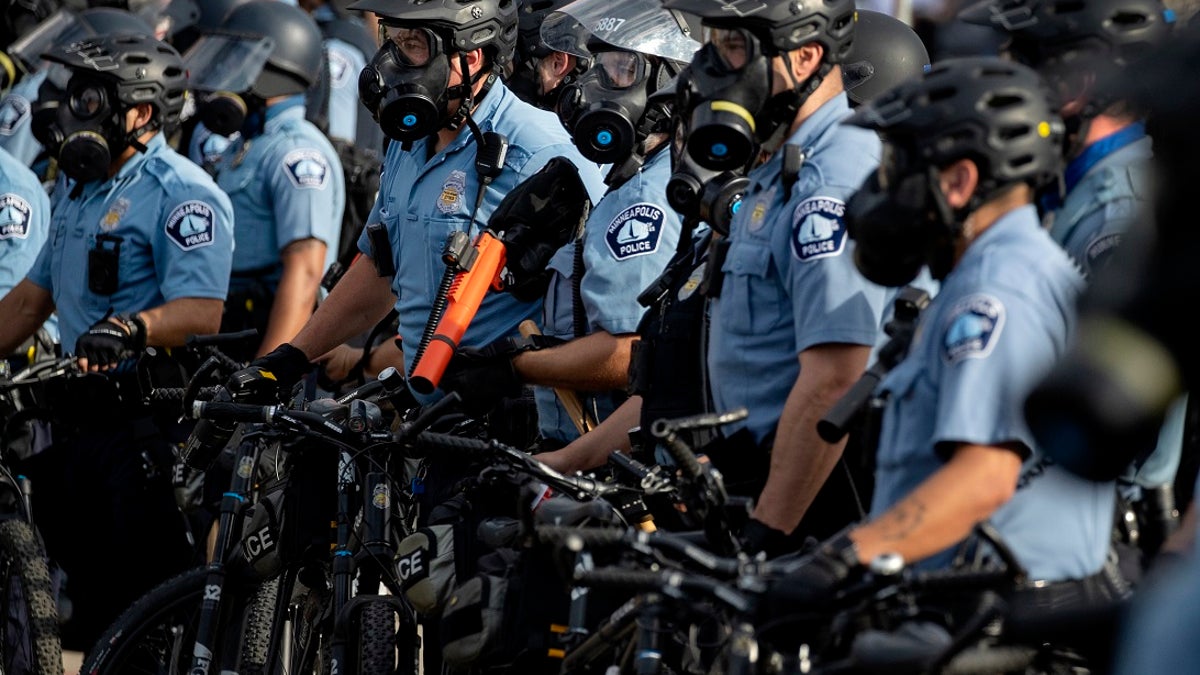
In this May 27, 2020, file photo, police gather en masse as protests continue at the Minneapolis 3rd Police Precinct in Minneapolis. The Minneapolis protests sparked others nationwide. (Carlos Gonzalez/Star Tribune via AP, File)
MINNEAPOLIS ACTIVIST ARGUES 'DEFUND POLICE' ABOUT 'EQUAL TREATMENT,' NOT DISMANTLING LAW ENFORCEMENT
"We've been hearing from numerous of our members and supporters that because of COVID-19 and the state of emergency, the sheriff's offices are only doing appointments only to accept permit to carry applications and that they are being scheduled months out," Doar said of Hennepin and Ramsey counties -- where Minneapolis and St. Paul are located. Both county sheriff's departments note on their website that appointments are necessary to get a permit to carry. "We just had somebody who called us and said that the earliest he can get an appointment is Oct.19 for his permit to carry application."
Doar also claimed that he's seen cases of people in Minneapolis having their permits to purchase firearms -- which are issued by the Minneapolis Police Department -- taking more than the state-mandated seven days to process.
The Hennepin County Sheriff's Office told Fox News that they are processing all of their permit to purchase applications within seven days, but that there are long delays before people can apply to get a permit to carry.
"With regards to permit to carry applications, we have been processing all of our permits to carry within 30 days of receipt of the application," a spokesperson for the department said, noting that all permit to carry applications must be submitted in person. "However, since we have went to appointments, people may have to wait 60 days until they are able to submit their application."
A representative of the Minneapolis Police Department confirmed in an email that applications are taking between seven and 14 days, with the "majority being 7 days." The representative said that is attributable to an "enormous increase" in permit to purchase applications, yet the city still has "the same 2 people working the applications." The spokesperson also noted some applications are taking longer because people will sometimes make mistakes on mail-in applications, requiring follow-up on the part of the police department.
As of the end of June, the representative said, the city had processed over 1,200 more applications compared with the same year-to-date time period in 2019.
Yet in Minneapolis, violent crime as of Aug. 3 is at a five-year high. Specifically, homicides have almost doubled, with 41 through Aug. 3 in 2020 compared with 21 in 2019. The second-highest number of homicides in Minneapolis during that timeframe was 24 in 2017. Aggravated assault is up to 1,679 in 2020 versus 1,423 in 2019. 2017 again ranks second, through Aug. 3. There were 1,476 aggravated assaults.
Nevertheless, Minneapolis is considering perhaps the most radical approach toward changes in its police department of any city in the country. A majority of its City Council has gotten behind a push to completely dismantle its police department and replace it with a public safety approach that would send unarmed professionals to help in many circumstances where police would normally be called, like domestic disputes or mental health calls.
The city's Charter Commission, an unelected body, voted not to put a ballot initiative to do just that to voters in November, instead pushing off the issue to 2021. The move, which did not completely foreclose the possibility of such drastic change in the future, roiled City Council members and activists there.
"While I appreciate The Charter Commission's engagement and effort to take up this proposal, they failed to act when the people told them what they did not want to hear," Jeremiah Ellison, a council member and the son of Minnesota Attorney General Keith Ellison, said. "That is not democracy. In a democracy, the people decide. But I guess the commission thought they knew better."
CONTROVERSIAL PROPOSAL TO REPLACE MINNEAPOLIS POLICE BLOCKED FROM BALLOT
He added: "This is NOT the last chance we will have to dramatically rethink public safety in our city We will quickly be in 2021 budget discussions, we will continue to ramp up community engagement on the future of public safety, and we will revisit the charter change for the 2021 ballot."
California also preempts local governments from regulating gun registration and permitting, but it's known for having some of the strictest laws in the country, including both a 10-day waiting period on purchases and a background check.
That means people in Los Angeles, where there's already been a $150 million budget cut to the police department and voters will consider a ballot measure in November to shift another $880 million from law enforcement to community programs, according to FOX 11 Los Angeles, will encounter a delay if they try to buy a firearm for the first time.
Meanwhile, homicides and shots fired are both up this year through July 18 compared to 2019 and 2018 -- the only other two years for which such data was available. There were 157 homicides in 2020, compared with 138 in 2019 and 148 in 2018. The number of aggravated assaults is also up slightly, while the number of shooting victims (549) is down a bit from 2019 (568), but up compared with 2018 (531).
CLICK HERE TO GET THE FOX NEWS APP
And in San Francisco violent crimes like homicide and assault, through Aug. 2, are down compared with prior years (available data goes back to 2017), but burglary and motor vehicle theft are up significantly. There have been 4,119 burglaries in the city in 2020, compared with 3,373 in 2018 -- the burglary numbers for the city were below 3,000 in both 2019 and 2017. There have been 3,227 incidents of motor vehicle theft in San Francisco in 2020 as of Aug. 2, up sharply from 2,526 in 2019. There were 2,447 reported motor vehicle thefts in 2018 and 3,139 in 2017.
Yet last week according to FOX 2, San Francisco Mayor London Breed laid out a plan that would cut $120 million from the city's police department and shift the funding to other community programs.
Those looking to buy a firearm in the city will have a tough time, however. NPR reported that the last gun store in San Francisco closed up shop in 2015, citing reasons including the city's strict stance on guns.
Fox News' Louis Casiano and John Escherich contributed to this report.




